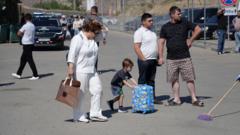In the wake of directed attacks on Iran's nuclear facilities, officials exhibit mixed reactions about national strategy amid public demonstrations of support.
Iran Faces National Humiliation Amid U.S. Air Strikes

Iran Faces National Humiliation Amid U.S. Air Strikes
Iranian government struggles to maintain a facade of normalcy following significant military strikes from the U.S.
June 22, 2025, 4:05 p.m. ET – Following recent U.S. military strikes that targeted its three main nuclear sites, Iran is experiencing a palpable sense of defeat among its leadership. Government insiders describe an atmosphere of national humiliation compounded by diverging opinions on an appropriate response.
While the physical damage of the strikes at Fordo, Natanz, and Isfahan is evident—satellite images revealing extensive destruction—Iranian officials are publicly striving to convey a sense of business-as-usual. Despite the turmoil, President Masoud Pezeshkian toured Tehran, stopping to engage with citizens and visiting hospital patients affected by the conflict. He emphasized resilience on social media: “We will walk this path together. We will protect Iran and show the world that our great people are undefeatable.”
However, some internal voices are suggesting a shift in strategy. Hamid Hosseini, part of Iran's Chamber of Commerce energy committee, acknowledged the military and technological disadvantages faced by the nation and called for prioritizing national interests over prolonged conflict. “We are not supposed to be at war forever,” he stated during a phone interview from Tehran.
As tensions rise, the government's attempts to project stability may fall short amidst the visible anguish and frustration of the populace and the emboldened responses internationally.
While the physical damage of the strikes at Fordo, Natanz, and Isfahan is evident—satellite images revealing extensive destruction—Iranian officials are publicly striving to convey a sense of business-as-usual. Despite the turmoil, President Masoud Pezeshkian toured Tehran, stopping to engage with citizens and visiting hospital patients affected by the conflict. He emphasized resilience on social media: “We will walk this path together. We will protect Iran and show the world that our great people are undefeatable.”
However, some internal voices are suggesting a shift in strategy. Hamid Hosseini, part of Iran's Chamber of Commerce energy committee, acknowledged the military and technological disadvantages faced by the nation and called for prioritizing national interests over prolonged conflict. “We are not supposed to be at war forever,” he stated during a phone interview from Tehran.
As tensions rise, the government's attempts to project stability may fall short amidst the visible anguish and frustration of the populace and the emboldened responses internationally.























